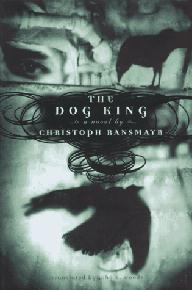

THE DOG KINGby Christoph RansmayrTranslated by John E. WoodsKnopf0-679-45057-2355pp/$24.00/April 1997 |
 |
In the world of Christoph Ransmayr's The Dog King (German title Morbus Kitahara), Germany lost World War II and was forced to suffer a long and degrading occupation by a variety of Allied forces. The village of Moor came under the command, eventually, of Major Elliott. Under orders, Elliott took away all technology from the villagers, forcing them to live a Medieval, agricultural existence. And yet, the novel is not about how the villagers deal with this technological change.
Instead, Ransmayr focuses on three individuals in the village: Bering, Lila and Ambras. All three are loners who eventually come together in a sort of alliance. Ambras, The Dog King of the title, is a camp survivor left behind to be "in charge" of Moor when Major Elliott was pulled out. His position and his history force him into the role of outsider. Lila is a refugee whose family was trapped in Moor as they tried to flee to Brazil. Remaining in the village, Lila hopes her father, carted off after the war as a war criminal, may someday return. In the meantime, she scavenges and tries to make an existence for herself. Bering is of the village, but never quite accepted by his fellow citizens. He remains aloof, more interested in the mechanical workings of burnt out cars than the human workings of the villagers.
There is very little dialogue in The Dog King. Most of the action and conversations is related through descriptive narrative. This causes the characters to have very little voice of their own. This technique has a duel effect of retaining the loner status of the characters, since the reader never really can get to know them personally, and giving the novel a disassociated feel.
Action also is at a premium in The Dog King. Ransmayr spends several chapters giving his historical background and showing the characters moving through life. Eventually, when Bering's eyesight begins to fail, the three characters take their own fate into their hands as they flee the desolation and pessimism of the world of Moor.
As with any translation, it is always difficult to tell how much of the novel is the author and how much the translator. In this case, I own three other novels translated by John E. Woods, so I feel I can safely say that it is Ransmayr's style, rather than Woods's translation skills which make The Dog King a difficult book to read.
The Dog King is not a book to read if you are interesting in adventure or characterization. Instead, it is a book given to introspection and contemplation. From its beginning theme on the evils of war to the end when it almost focuses on the idea of predestination, The Dog King is a thoughtful, and at times difficult, novel.
